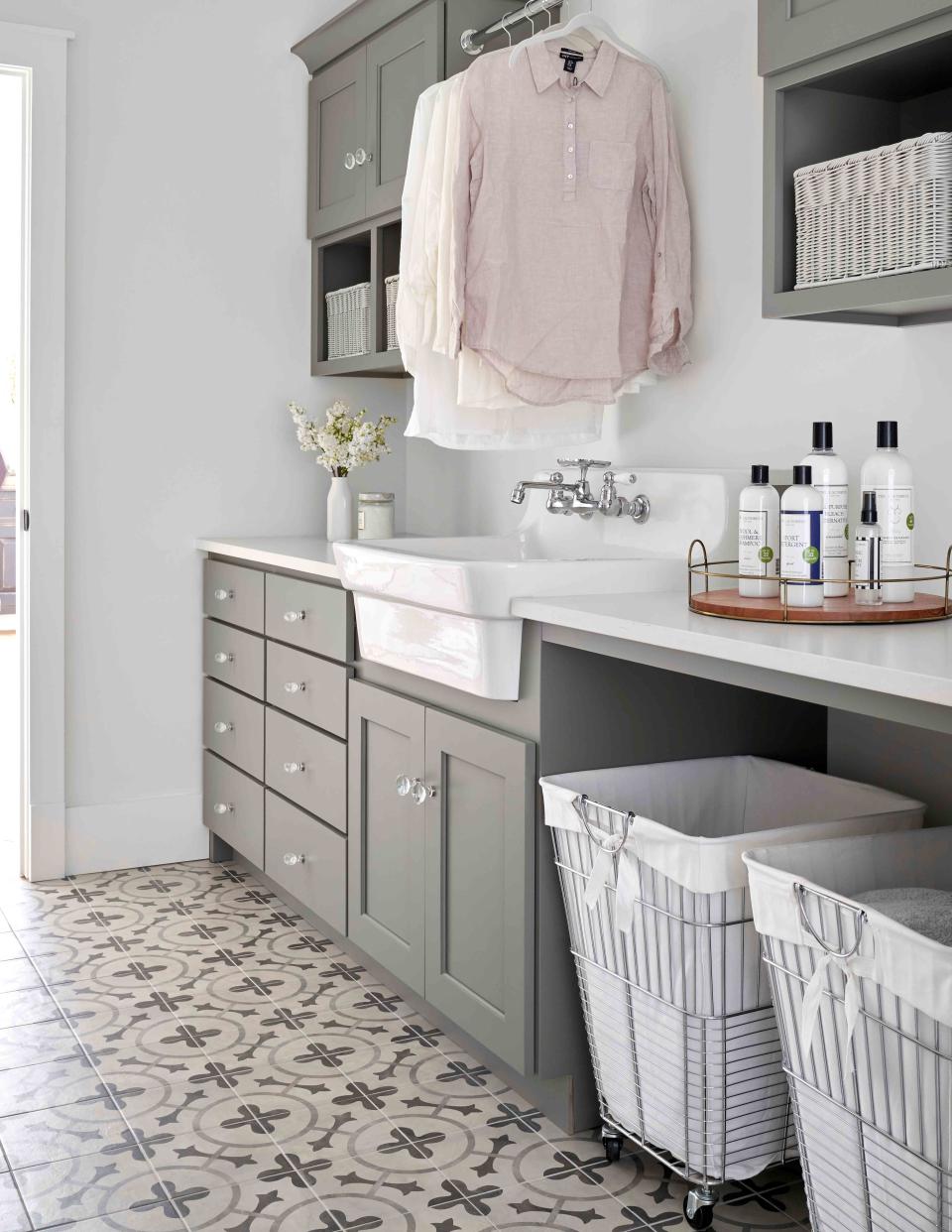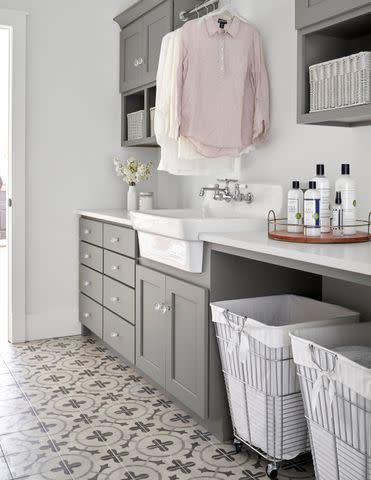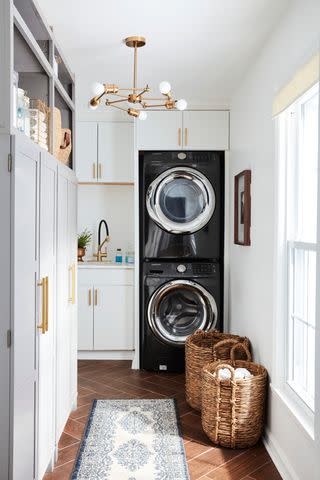The Best Flooring for Laundry Rooms (Plus 3 to Skip)
Struggling to choose the best flooring for a stylish and hassle-free laundry room? Try these three top picks.

Nathan Schroder
Matching the right flooring style and functionality to each room is important. Carpets in bathrooms are a rarity for good reason. Laundry rooms must accommodate heat, moisture, and spills. Also, some are located in mud rooms or entranceways that are prone to heavy foot traffic. Here, design experts offer the best water-resistant, aesthetically pleasing, and durable flooring options for any laundry room. Better still, they offer three laundry room flooring choices to avoid. Without sacrificing style for functionality, here’s everything you need to know to make the right choice for your next laundry room renovation.

Nathan Schroder
What Defines Ideal Laundry Room Flooring?
Mariya Snisar, the Head of Interior Design at Renowell, says that the laundry room flooring needs to be durable, moisture-resistant, and easy to clean. Also, flooring should be comfortable underfoot and match the room’s overall aesthetic.
Laundry rooms are home to chemicals, detergents, and very dirty clothing. Water-resistant flooring can prevent water damage, mold growth, or warping. Laundry room appliances and sinks are known to overflow or retain heat, so flooring must be able to withstand a mishap.
Related: The 4 Best Washer/Dryer Sets of 2023, According to Our Testing
Lastly, people in laundry rooms spend a lot of time on their feet or bending down to reach appliance doors. Anti-fatigue flooring can improve the experience of using this utility room day in and day out.

David Land
What Are the 3 Best Flooring Options for Laundry Rooms?
Among the ideal characteristics, there are a few flooring types that check all the boxes. Vinyl, tile (ceramic or porcelain), and rubber flooring are the best options, according to experts. Each can withstand the heat and moisture of a typical laundry room.
Vinyl Flooring
Vinyl flooring is a practical option for laundry room flooring. Charlotte Granville, a Home Remodeling Specialist at Fixr.com, says that sheet vinyl flooring is both durable and waterproof, making it one of the best and most affordable options for laundry room flooring. Sheet vinyl comes in a variety of different styles and colors, so it can easily mimic the look of wood or stone floors found throughout the rest of the house. Vinyl flooring doesn’t have seams or separate pieces that would collect moisture. Granville also suggests sheet vinyl. At $2 to $5 a square foot to install, it is an economical option.
For a high-end look, luxury vinyl tile is a thicker choice. Though more expensive to install than sheet vinyl, it is slightly more insulated and padded. This can make it softer on aching feet, knees, and backs.
Related: How to Install Loose-Lay Sheet Vinyl Flooring in a Few Hours
Ceramic and Porcelain Tile
A more stylish alternative to cement flooring, ceramic and porcelain tile are ideal choices for laundry rooms because they are durable, water-resistant, and easy to maintain. Snisar says this flooring can withstand foot traffic from the everyday use of the laundry room.
Porcelain tile is also not porous and won’t absorb moisture, Granville adds. These tiles are easy to clean. They can handle spills, moisture, and heat without warping or staining. Ceramic and porcelain tiles come in a wide range of styles, colors, and patterns to suit any laundry room decor. Porcelain tiles are more costly than ceramic tiles, but depending on the size and configuration of your laundry room the difference might be negligible.
Rubber Flooring
Similar to vinyl flooring, rubber flooring for laundry rooms is a unique and inexpensive option. Rubber flooring is installed wall-to-wall in the form of sheets or interlocking tiles. Snisar says they are durable and very easy to clean. This affordable flooring comes in a variety of colors and can easily be swapped seasonally for new looks. More importantly, rubber flooring can handle a washing machine and a dryer’s weight. And it can make the job of loading and folding laundry much easier on the back and knees.
What Are the 3 Worst Flooring Options for Laundry Rooms?
Some flooring options aren’t ideal for laundry rooms. They may cause more trouble than they’re worth. They don’t withstand moisture or heat well enough for this room. Although these may be high-quality options in other rooms, they will not last long in a laundry area.
Carpet and Cork
Snisar recommends against these options because they are very absorbent. Spills will be drawn into the fibers and can cause mold. “Moisture that is released from condensation as the dryer goes through its cycle will also get absorbed into these soft surfaces and will give the room a musty smell,” Snisar says. Skip carpet and cork to save yourself the stress and money of repairs.
Wood
While hardwood and laminate flooring may look aesthetically pleasing in a laundry room, they are not the best option for the moisture and heat emitted from washing machines and dryers. Condensation and any water spills seep into the wood grain of hardwood flooring and cause swelling and warping, Snisar notes.
Compared to other flooring options, Granville also says laminate flooring is not the most moisture-resistant. Expect swelling when it gets wet. In climates that go from extremely hot to extremely cold temperatures, laminate flooring is not ideal for the laundry room. “Temperature variations combined with the condensation from the dryer and washer will cause the floor slats to contract,” Snisar says, “resulting in gaps where moisture can penetrate the laminate layers or expand and warp the floor surface.”
Mosaic and Marble
Mosaic and marble flooring, while beautiful, is not suitable for laundry rooms. Snisar says that mosaic flooring can be uneven. This unevenness can make the washer and dryer wobble, causing added wear and tear on the machine.
Also, natural stones like marble are porous, Granville reminds. They are not suitable for high moisture areas. “Marble can be susceptible to staining and damage if it gets wet,” she says. If you opt for any natural stone flooring in the laundry room, select one that is well-sealed to withstand the heat.
For more Better Homes & Gardens news, make sure to sign up for our newsletter!
Read the original article on Better Homes & Gardens.

